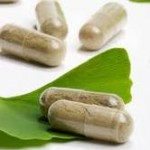No effects of omega‑3 supplements on Alzheimer’s symptoms
 The L.A. Times reports today the negative results of the latest randomized trial testing the effects of DHA supplements on Alzheimer’s symptoms (DHA is an omega‑3 fatty acid).
The L.A. Times reports today the negative results of the latest randomized trial testing the effects of DHA supplements on Alzheimer’s symptoms (DHA is an omega‑3 fatty acid).
The study … examined 402 people with mild to moderate Alzheimer’s. They were randomly assigned to take 2 grams a day of omega‑3 capsules containing docosahexaenoic acid (or DHA) or a placebo capsule. The participants were followed for 18 months, and their cognitive and functional abilities were reassessed. They also underwent MRI to look at the brain.
There was no benefit seen in the patients taking omega‑3 fatty-acid supplements in either brain volume or cognitive function.
Comments: Does this study mean that DHA or omega‑3 in general are not good for the brain? No! This study suggests that taking DHA supplements after Alzheimer’s diagnosis is not helpful. Prior evidence shows that omega‑3 consumption (especially DHA) long before the onset of Alzheimer’s symptoms reduces the risk of developing the disease. Indeed, several studies have shown that eating fish (the primary source in our diet of omega‑3 fatty acids) is associated with a reduced risk of cognitive decline or dementia.
The authors of the JAMA study also speculate that DHA supplements could be used as a treatment for people who have not yet been diagnosed with Alzheimer’s but are already developing dementia pathology in their brain: “Individuals intermediate between healthy aging and dementia, such as those with mild cognitive impairment, might derive benefit from DHA supplementation, although further study will be necessary to test this hypothesis.”



Thank you for your comments Pascale.
A similar study from the Karolinska Institute published in JAMA in October 2006 noted that Omega ‑3 supplementation (they used DHA and EPA) was only of benefit in a small subgroup of their study who had only very mild cognitive impairment. Their rate of cognitive decline was slower over the 6 months than a control group. They also made the comment that a possible reason why the positive effects were only seen in those with very early stage disease, is that there may be a critical period of several years before the disease manifests itself clinically, whereby the anti-inflammatory effect of the fish oil may be able to exert an effect on the neuropathology.
Thanks Jenny: Very interesting and complementary to the original post!
Thank you for posting this article. I do feel that supplementing with CoQ10 and Omega’s can improve people’s overall health and hopefully delay the onset of certain diseases and sicknesses. I would assume that it would be very hard to reverse these effects once you are already sick. Prevention is Key!
The study in itself did not even hit upon the therapeutic dose of fish oil at 10 grams per day. Also, in my research as a PhD in psychology at Saybrook University have found that if a person uses the wrong kind of vegetable oils in their meals it will cancel out the DHA or omega‑3 on a cellular level. I have had success with people with dementia who took fish oil at a therapeutic level, using olive oil in their foods and using butter.I have been researching omega‑3 for two years now and have seen drastic results in people who have used fish oil.
I would like to see a study where they also use raw foods at every meal with fish oil and the right supplements. I wish you could post the whole article so that we can see if those issues were covered. I am sure that over a million dollars was spent on this study.
Thanks for sharing your results Anne: Very interesting! I cannot post the whole original article but here is the reference:
Quinn, Raman, Thomas, Yurko-Mauro, Nelson, et al. (2010). Docosahexaenoic Acid Supplementation and Cognitive Decline in Alzheimer Disease. A Randomized Trial. JAMA, 304(17):1903–1911.
Pretty intriguing information there Anne! I’ll further research this, but I had no idea that certain vegetable oils can cancel out the omega‑3 I take on a daily basis. I usually stick with olive oil when cooking, but I’ll use vegetable oil as a substitute.
@Anne, you mention 10 grams as a therapeutic dose. How much should one take for a preventative dose? Thank you!
Is DHA need not to be consumed ? Often in advertisement we see that the drink has DHA that could help brain. Is that information true?